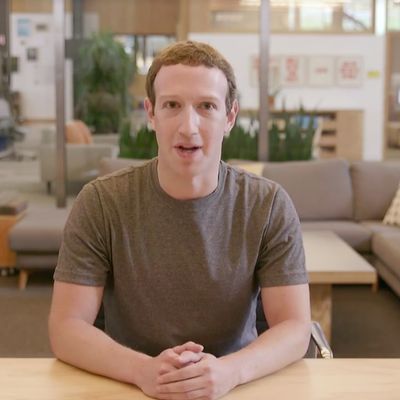
Having solved the thorny problem of patriotism and protest by tweeting incessantly about the NFL, Donald Trump has moved on to another top administrative priority: Facebook. “Facebook was always anti-Trump.The Networks were always anti-Trump hence,Fake News, @nytimes(apologized) & @WaPo were anti-Trump. Collusion?” he tweeted yesterday, for reasons that I imagine had to do with whatever was on cable news at that moment.
CEO Mark Zuckerberg protested, naturally. “Every day I work to bring people together and build a community for everyone. We hope to give all people a voice and create a platform for all ideas,” he wrote in a status update yesterday. “Trump says Facebook is against him. Liberals say we helped Trump. Both sides are upset about ideas and content they don’t like. That’s what running a platform for all ideas looks like.”
Facebook has been under a particularly intense spotlight over the last few weeks, after admitting that Russian actors had purchased $100,000 worth of political ads on its platforms between 2015 and 2017. The added burden of an unpredictable president declaring war is a lot more than most companies could bear.
But for all Zuck’s tone of indignation, Trump making an enemy out of Facebook is, in this current moment, the best thing that could happen to the company. And for all the outcry, the Russian-ads controversy will be similarly beneficial in the long term. As its role in politics is finally being intently examined, with regulation and sanction from the government theoretically on the table, specific bad actors like “Russian operatives” allow Facebook to make minor changes to its platform without addressing root issues. And castigation from the president allows Facebook to step back and claim that complaints from both sides are proof that the site truly is a neutral “platform for all ideas,” and not a political force that demands attention or regulation.
For most of last year, the political heat on Facebook has come from liberals. The charges were at first fairly simple: Facebook had not been diligent enough in preventing misinformation, and its laxity had allowed hoaxes and lies to reach enormous audiences. In the months after the election, “fake news” blossomed into a moral panic.
More rigorous analysis of the media environment in which the election took place has found that “fake news” in its most technical definition — intentional hoaxes designed to make money from advertisements — likely had little effect on the election. But that doesn’t mean that Facebook gets off the hook. A study last year from Harvard’s Berkman Klein Center for Internet & Society found, through social-media analysis, that Facebook and other social-media sites had created an “attention backbone” that allowed conspiracy theories and far-right beliefs to work their way from fringe media up to mainstream media outlets.
And this played out more often on one side than the other. “Conservative media is more partisan and more insular than the left,” the study found, meaning that the two poles of the media landscape are center-left and far-right. In other words, there is not an equal distribution or cross-pollination of ideas across different political spheres on Facebook — not quite the neutral platform for all ideas Zuckerberg holds up. The Berkman Klein report concluded that “[d]isproportionate popularity on Facebook is a strong indicator of highly partisan and unreliable media.”
Facebook doesn’t see itself as a media organization. It sees itself as a distribution network — a so-called “dumb pipe” that mostly doesn’t discriminate about what passes through. That’s how Russia enters into it. A highly partisan, more or less completely unregulated platform that allows advertisers to pay for further reach is ripe for exploitation. The Internet Research Agency, Russia’s premier “troll farm,” reportedly experimented with posts and events to get conservatives riled up about issues like immigration, terrorism, and LGBTQ rights. They even created events and political rallies, which functioned as messaging in their own way, even if the events themselves were actually flops. Now that knowledge of these Russian-backed troll pages has come out, Facebook executives will likely be forced to testify in front of Congress, and possibly submit to FEC regulations.
But in the long term, the hang-up on Russia is great for Zuckerberg. To recap what we know, Facebook found ads bought by the Kremlin-linked Internet Research Agency — about 3,000 ads with a spend in the low six figures. That doesn’t get you a ton of reach on Facebook. The Russian operation, while concerning and in obvious need of regulation, likely did not affect the election outcome in any discernible way. But the fervor over it, tied into overarching suspicion of collusion between the Trump campaign and Russia, allows Zuckerberg to apologize for a minor oopsie and publicly fix a problem, while skirting the much larger issue: that Facebook has exacerbated partisanship to extreme levels and tilted the media environment toward the right wing as a result.
At the same time, Trump’s anger both protects Zuckerberg against cries from the left (“The right is mad too!”), and allows Facebook to triangulate itself as the neutral platform that everyone hates. Funnily enough, Zuckerberg all but admits this. He writes that “the data we have has always shown that our broader impact — from giving people a voice to enabling candidates to communicate directly to helping millions of people vote — played a far bigger role in this election” than fake news or Russian ads. He’s right. That’s the problem.





























